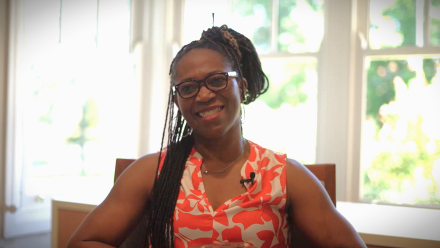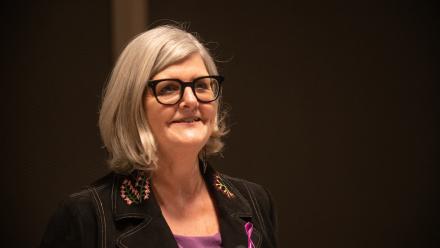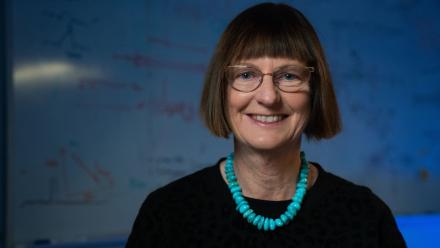A journey of a lifetime: From war survivor, to academic, to mother and changemaker
“Live it one day at a time. And when you're in a position of acquiring education... please use your education to share some of the pain or empathize with some of the pain that people face in the world. Because with our education comes responsibility.”
A powerful image: a baby carried on stage by a proud mother clad in the PhD regalia of the Australian National University (ANU). This photo, taken at Llewellyn Hall in 2019, features Dr. Veronica Fynn Bruey (PhD '19), a Liberian Canadian, an Indigenous migrant war survivor, an esteemed academic, and a proud mother and feminist.
For 2021 ANU International Alumna of the Year, Dr Veronica, this moment was “both a political statement and a personal statement of my identity of being a mother.” Reflecting on the birth of her child shortly after submitting her PhD dissertation to ANU, Dr. Veronica shares, “It was a huge transition in my life that gave meaning and added more qualification to what I was doing in my research and teaching for women and children.” By stepping onto that stage with her baby, she declared to the world that her achievements were intertwined with this tiny human being at the core of her life.
True to her words, Dr. Veronica brought her child to various conferences, workshops, and debates worldwide during the 18 months she was breastfeeding. She used this opportunity to challenge the expectations of academia and the perceived role of women, where mothers are often seen as staying home to care for their children. By refusing to pause her research, she highlighted that motherhood is fundamental to society. She underscored that everyone is born of a mother and that women can accomplish extraordinary things while embracing motherhood.
The silent yet powerful act of having her child on stage represented her stance.
Through the lens of motherhood, feminism, and colour, Dr. Veronica reframes academic discourse on Indigenous Peoples, migration, and displacement, raising challenging questions about identity and patriarchy and how they shape the lived experiences of many. Her book, Patriarchy and Gender in Africa, investigates the primacy of patriarchy and discrimination against women in Africa, particularly concerning wife-beating and household decision-making. Another publication explores Reproductive Health Rights in Liberia. Additional works delve into the legal discrepancies affecting displaced women and children and individual migrant journeys.
Her efforts to shift academic discourse away from a predominantly male perspective bring vigour to the field, amplifying the voices of young girls experiencing violence, war, and discrimination worldwide.
Recently named the Africa-Oxford Fellow (2023-2024) at the Refugee Study Centre, Oxford Department of International Development, Dr. Veronica is eager to extend her research into new conversations about forced migration before 1939 which includes Indigenous displacement, medieval violence, slavery, colonialism, imperialism and globalisation, applying her perspectives on womanhood, motherhood, and lived experiences to these historical discussions.
“And I just want to shout out to all those people, all those females—sorry, I'm a feminist—all those young girls going through challenges to be inspired.”
As an activist, teacher, and academic, Dr. Veronica uses her platforms to challenge societal perceptions of womanhood and motherhood. She hopes that one day, society will better appreciate and recognise the impacts of motherhood in every aspect of our lives. Through her actions, from breastfeeding in public to asserting her rights as an Indigenous Black African woman to continue her work and research, she confronts the challenges women face in academic institutions.
To all the young girls around the world, Dr. Veronica urges you to be inspired:
“Live it one day at a time. And when you're in a position of acquiring education as I've done at ANU, please use your education to share some of the pain or empathize with some of the pain that people face in the world. Because with our education comes responsibility.”


